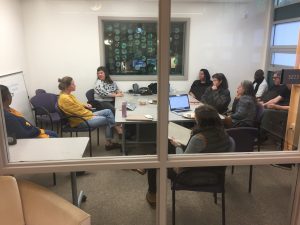From Pitching Stories to Investigative Journalism, Guest Speakers Share Knowledge with the KALW Audio Academy
By Ben Trefny, News Director, KALW Public Radio
The studios of KALW were filled with more than their usual share of talented audio journalists over the last few weeks, as we invited four guest speakers to talk with our Audio Academy fellows.
Adizah Eghan, a producer with Snap Judgement, Skyped in on Monday, April 16.
Victoria Mauleon, an editor on The California Report, came by on Tuesday, April 17.
Marlon Bishop, who works with Latino USA, spoke with us on Wednesday, April 18.
Bob Carlson, host of Unfictional, shared his time on Thursday, April 19.
We also had a great in-house conversation with the KALW team that produced Persistent Poison: Living with Lead Poisoning. If you haven’t heard it, please take a listen! It’s public service journalism at its finest, and very possibly life-changing for the people who listen and take action to protect themselves and the people around them.
Audio Academy mentor Lisa Morehouse edited that project, and two other mentors worked as reporters. Those were Marissa Ortega-Welch and Angela Johnston, who is an Audio Academy graduate herself (’14) and now works as our energy and environment reporter. She taught Audio Academy Fellows a seminar this week on investigative journalism.
Here’s some insight from Angela into how those classes went:

Clockwise from the left, Chris Hambrick (’15) listens to Angela Johnston (’14), Lisa Morehouse, and Marissa Ortega-Welch hold a brown-bag conversation about their investigative reporting project on lead poisoning, which was also attended by Zoe Lew, Atemu Aton (’18), Josh Wilson, Judy Silber, and Amber MIles (’18).
This week in the Audio Academy seminars we focused on investigative reporting techniques, specifically filing public records requests. There’s this stereotype that filing FOIA or public records requests is something that only investigative reporters do, that they take a lot of time, and are only needed for groundbreaking, ‘holding power accountable’ types of stories. However, it’s actually really simple to file a public records request, and as we learned, it’s possible to go deeper and gather more information for any type of story – ones about history, chocolate, or court language interpreters.
Each fellow took the story they were currently working on and brainstormed how they wanted to go further to get information that wasn’t already out there. Together, we walked through the steps of writing filing a FOIA or public records request. Amber Miles requested truck driver fatigue reports from Federal Motor Carrier Safety Administration. Lilia Vega requested medical records on a forced-sterilization patient she is profiling and medical board complaints on the doctor who did the most sterilizations from the California Department of Developmental Services and the California State Medical Board. To strengthen their reporting on a show about chocolate, Zeina Nasr and Asal Esanipour requested data from the USDA on the number and names of cacao bean importers in the US. They also requested a list of every single food business registered in California with the word “chocolate” in their name. For her story on the need for Mam language interpreters, Marisol Medina Cadena asked the California Courts and the Alameda County Courts for all public requests for Mayan language interpreters in court over the past 10 years.
Hopefully, everyone will get data or records back soon. Then, the next step will be learning how to interpret and work it into their stories!
